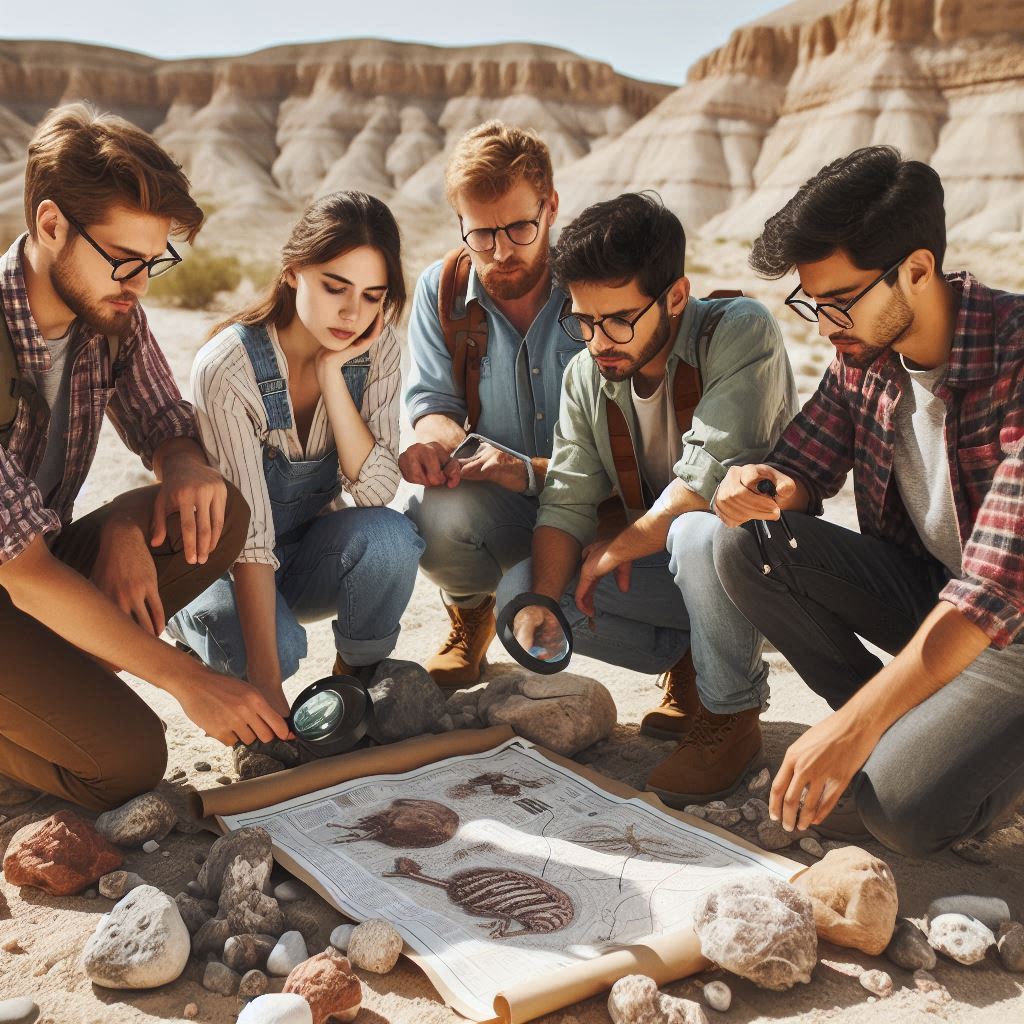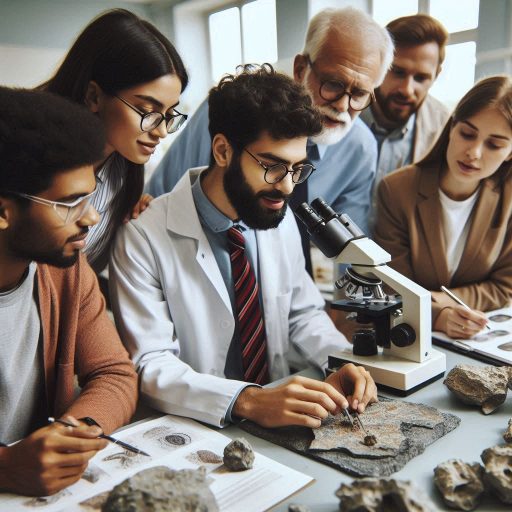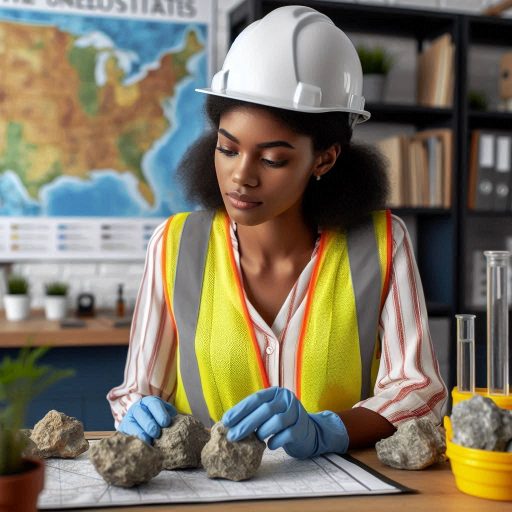Introduction
Networking is vital for aspiring geologists seeking to advance their careers.
Building professional relationships opens doors to new opportunities and insights.
Engaging with industry professionals enhances your knowledge and skills, making you more competitive.
Effective networking can lead to job opportunities that may not be advertised.
Many positions fill through referrals and personal connections.
By connecting with experienced geologists, you increase your chances of being recommended for roles.
Networking also helps you learn about internships and entry-level positions that can kickstart your career.
Additionally, networking fosters mentorship relationships.
Experienced professionals can provide guidance, share their experiences, and offer valuable advice.
Mentorship can help you navigate the challenges of the geology field and enhance your understanding of the industry.
Participating in professional organizations and attending conferences expands your network.
These events provide opportunities to meet experts and peers.
Engaging in discussions and sharing your interests can lead to meaningful connections.
Social media platforms, especially LinkedIn, are excellent tools for networking.
They allow you to connect with professionals worldwide and join relevant groups.
Regularly sharing your insights and achievements can help you stand out in the geology community.
Networking is crucial for aspiring geologists.
Join professional organizations
Benefits of Joining Geological Organizations
Joining organizations like the Geological Society of America (GSA) or the American Association of Petroleum Geologists (AAPG) offers many benefits.
Membership provides access to valuable resources and publications.
These organizations publish journals that keep members informed about the latest research and developments.
Additionally, members receive discounts on conferences, workshops, and educational materials.
These savings can significantly reduce the cost of professional development.
Organizations often offer scholarships and grants for students and early-career geologists.
Financial assistance can help aspiring geologists advance their education and careers.
Being part of a professional organization enhances credibility.
Employers often view membership as a sign of commitment to the field.
Membership can help aspiring geologists stand out in a competitive job market.
Moreover, organizations provide platforms for sharing research and findings.
Members can present their work at conferences and publish in peer-reviewed journals.
These opportunities enhance professional visibility and foster collaboration.
Networking with established professionals can open doors to mentorship and job opportunities.
Networking with fellow members also encourages the exchange of ideas and experiences.
Engaging with others in the field leads to professional growth.
Organizations often facilitate online forums and discussion groups for members.
These platforms allow members to ask questions, share knowledge, and discuss challenges.
Networking Opportunities at Conferences, Workshops, and Events
Conferences, workshops, and events provide invaluable networking opportunities for aspiring geologists.
These gatherings allow participants to meet professionals from various geological disciplines.
Attending events fosters connections that can lead to collaborations and job opportunities.
Conferences often feature keynote speakers and panel discussions.
Participants gain insights from industry leaders and experts.
Engaging in Q&A sessions encourages meaningful interactions.
Geologists can ask questions and seek advice from those with more experience.
Workshops offer hands-on learning experiences.
Participants can develop new skills and techniques relevant to their careers.
Networking during workshops fosters camaraderie among attendees.
Collaborating with peers on projects often leads to lasting professional relationships.
Many organizations host regional and local events, making networking more accessible.
These smaller gatherings facilitate intimate discussions and personal connections.
Members can easily introduce themselves and share their experiences.
Additionally, social events at conferences create relaxed environments for networking.
Casual settings encourage informal conversations and relationship-building.
Networking during meals or receptions allows attendees to connect on a personal level.
Online networking has also gained importance in recent years.
Many organizations host virtual events and webinars.
These platforms allow aspiring geologists to connect globally.
Online discussions often lead to fruitful collaborations and partnerships.
Moreover, networking doesn‘t stop after events conclude.
Following up with new contacts solidifies connections.
Sending personalized messages or connecting on LinkedIn fosters ongoing relationships.
This practice helps maintain a professional network that can support career growth.
Joining organizations like GSA and AAPG offers aspiring geologists numerous benefits.
These memberships provide resources, credibility, and networking opportunities.
Conferences, workshops, and events serve as platforms for meaningful connections.
Engaging with fellow geologists fosters collaboration and professional growth in this dynamic field.
Read: U.S. Cities with the Most Opportunities for Environmental Scientists
Attend industry events and conferences
Importance of Attending Local and National Geology Conferences
Attending local and national geology conferences is crucial for aspiring geologists.
These events provide unique opportunities to learn from experts.
You can gain insights into the latest research and advancements in the field.
Conferences also showcase cutting-edge technology and methodologies used in geology today.
Networking is a significant benefit of attending these conferences.
You meet professionals who share your passion for geology.
Engaging with them helps you establish valuable connections.
These connections can lead to internships, job opportunities, and collaborations in the future.
Local conferences often focus on regional geological issues.
They allow you to understand local geology and environmental concerns.
Participating in these events helps you stay informed about local projects and initiatives.
You can learn about ongoing research and potential job openings in your area.
National conferences offer a broader perspective.
They gather geologists from various regions and specialties.
Attendees can exchange ideas and experiences, enriching your understanding of geology as a whole.
You‘ll discover diverse approaches to geological challenges and solutions across different areas.
Many conferences also feature workshops and field trips.
These hands-on experiences provide practical knowledge that enhances your skill set.
Workshops often cover specialized topics such as data analysis or field techniques.
Field trips allow you to apply classroom knowledge to real-world situations.
Engaging in these activities makes you a more competitive candidate in the job market.
Engaging with Professionals in the Field and Building Connections
Also, engaging with professionals in the field is essential for career development.
Start conversations with speakers and attendees at conferences.
Ask questions about their research or experiences in the industry.
Most professionals appreciate enthusiasm and curiosity from newcomers.
When networking, approach conversations with a genuine interest in learning.
Avoid being overly formal; be yourself and show your passion.
Share your aspirations and ask for advice on pursuing a career in geology.
Many professionals enjoy mentoring aspiring geologists and offering guidance.
Utilize social media platforms to enhance your networking efforts.
LinkedIn is a powerful tool for connecting with professionals.
After meeting someone at a conference, send them a connection request.
Include a personalized message reminding them of your conversation.
This follow-up keeps you on their radar and reinforces your interest.
Joining professional organizations also expands your network.
Many geology associations offer student memberships at a reduced rate.
These organizations host events, provide resources, and facilitate connections with industry professionals.
Being an active member shows your commitment to the field.
Consider volunteering at conferences or local geological events.
This involvement allows you to meet more professionals and gain behind-the-scenes insights.
Volunteering also demonstrates your dedication and willingness to contribute to the geology community.
Attending local and national geology conferences is essential for aspiring geologists.
These events offer invaluable learning and networking opportunities.
Engaging with professionals in the field allows you to build connections that can advance your career.
By being proactive and genuine in your interactions, you can create lasting relationships that support your journey in geology.
Read: Environmental Scientist vs. Ecologist: Roles and Differences in the US
Connect on social media
Utilize platforms like LinkedIn to connect with other geologists and industry professionals
Networking is crucial for aspiring geologists.
One effective way to network is through platforms like LinkedIn.
This platform allows you to connect with fellow geologists and industry professionals.
Start by creating a strong profile that highlights your skills and experience.
Include keywords related to geology, research, and any relevant projects.
A well-crafted profile attracts potential connections.
Once your profile is set up, search for geologists in your field.
Use filters to find professionals based on location, industry, and expertise.
Sending personalized connection requests makes a positive impression.
Mention any shared interests or mutual connections to foster rapport.
Engage with your connections by sharing relevant content.
Post articles, research findings, or industry news that interests you.
This positions you as an informed professional in geology.
When you share valuable insights, others are more likely to engage with you.
Encourage discussions by asking questions in your posts.
Moreover, take the time to interact with your connections’ posts.
Comment thoughtfully on their updates to show genuine interest.
Engaging with their content strengthens your relationship and keeps you on their radar.
This two-way interaction fosters a supportive professional network.
Finally, consider reaching out for informational interviews.
Many professionals are willing to share their experiences and advice.
Prepare questions in advance to make the most of these conversations.
By establishing connections with experienced geologists, you gain valuable insights into the industry.
Join geology-related groups and participate in discussions
Joining geology-related groups is another effective networking strategy.
Look for groups on LinkedIn, Facebook, or professional organizations.
These groups often provide a platform for discussing industry trends and challenges.
Actively participating in discussions can enhance your visibility among peers.
Once you join a group, introduce yourself to other members.
Share your background, interests, and goals in geology.
This introduction helps others understand your expertise and how you can contribute.
Engaging in conversations about topics relevant to the group increases your credibility.
When discussions arise, share your insights and ask questions.
Contributing meaningfully demonstrates your knowledge and enthusiasm for geology.
Be respectful and open to different viewpoints.
Constructive dialogue fosters connections and encourages collaboration.
Additionally, consider attending webinars and virtual events hosted by these groups.
Participating in live discussions allows you to connect with industry experts.
Many events also offer networking opportunities through breakout sessions.
Prepare to engage with other participants during these sessions.
Finally, follow up with individuals you meet in these groups.
Send a brief message expressing your appreciation for their insights.
Mention specific topics you discussed to jog their memory.
Building on these initial conversations strengthens your connections.
Networking is essential for aspiring geologists.
Utilizing platforms like LinkedIn and joining geology-related groups enhances your professional connections.
Engaging in meaningful discussions and actively participating in the community fosters valuable relationships.
By implementing these networking tips, you will advance your career in geology and broaden your professional network.
Read: The Relationship Between U.S. Policy & Environmental Scientist Roles
Informational interviews
Reach Out to Geologists Working in Your Desired Field
Networking plays a crucial role in building a successful career in geology.
One effective way to network is by reaching out to established geologists.
You can find professionals through LinkedIn, industry conferences, or academic connections.
Use these platforms to identify geologists working in your desired field.
When you contact them, be polite and concise.
Introduce yourself and express your interest in their work.
Mention specific aspects of their career that intrigue you.
This personal touch makes your request for an informational interview more appealing.
Informational interviews provide valuable insights into the geology profession.
They allow you to learn about different career paths and opportunities.
Prepare for the interview by researching the geologist’s background.
Familiarize yourself with their projects and achievements to ask informed questions.
Ask Questions About Their Career Path
During the informational interview, ask open-ended questions about their career path.
Inquire about how they got started in geology.
Understanding their journey can offer guidance for your own career decisions.
Ask about the skills they found most valuable in their roles.
This information can help you identify areas to focus on in your studies.
Additionally, inquire about challenges they faced and how they overcame them.
Learning from their experiences can provide you with practical advice.
It‘s also essential to discuss the current trends in the geology field.
Ask how they see the industry evolving over the next few years.
This knowledge can help you prepare for future opportunities and challenges.
Advice for Aspiring Geologists
Geologists often have valuable advice for aspiring professionals.
They can recommend courses, certifications, or internships that enhance your resume.
Their insights can guide you toward gaining relevant experience before entering the job market.
Additionally, ask about the importance of networking within the industry.
Geologists can share their strategies for building connections.
They may suggest professional organizations or societies to join.
Becoming a member of these groups can expand your network and access valuable resources.
It‘s also wise to inquire about work-life balance in the geology field.
Geologists can provide insights into what to expect regarding travel and fieldwork.
Understanding these aspects can help you make informed decisions about your career path.
Potential Job Opportunities
Lastly, don’t hesitate to ask about potential job opportunities.
Geologists may know of openings in their organizations or networks.
They might even offer to connect you with hiring managers or recruiters.
Express your enthusiasm for opportunities and willingness to learn.
This positive attitude can leave a lasting impression and open doors.
Always follow up with a thank-you message after the interview.
Express appreciation for their time and insights, reinforcing your interest in their field.
Reaching out to geologists for informational interviews can significantly impact your career.
By asking thoughtful questions about their experiences, you gain valuable insights.
Their guidance can help you navigate the complexities of a career in geology.
Networking with professionals in your desired field will ultimately enhance your prospects and success in the industry.
Read: Organizations & Associations for Environmental Scientists in the USA

Volunteer for research projects or fieldwork
Volunteering Can Lead to Networking Opportunities with Experienced Geologists
Volunteering offers aspiring geologists a fantastic way to network.
Engaging in volunteer work allows you to meet professionals in the field.
Many experienced geologists appreciate the enthusiasm of newcomers.
They often share their insights and knowledge with volunteers.
You can find volunteering opportunities in various settings.
Many universities offer programs for students to assist in geological research.
Nonprofit organizations also seek volunteers for environmental projects.
Joining local geological societies can lead to additional volunteering chances.
These societies often host events that welcome volunteers.
Participating in fieldwork provides valuable experiences.
You can work alongside seasoned geologists, gaining practical skills.
This experience helps you understand geological processes and techniques.
Additionally, it enhances your resume, making you more appealing to potential employers.
Networking through volunteering can open doors to job opportunities.
Many geologists remember enthusiastic volunteers when hiring.
By building relationships, you increase your chances of getting recommendations.
These connections may lead to internships or full-time positions.
Moreover, volunteering can introduce you to various career paths.
You can learn about different areas of geology, such as environmental or petroleum geology.
This exposure helps you determine your interests and focus your career goals.
In summary, volunteering is a powerful tool for aspiring geologists.
It provides networking opportunities and practical experience, both crucial for your career.
Gain Hands-On Experience and Build Relationships with Potential Mentors
Gaining hands-on experience is essential for aspiring geologists.
Volunteering allows you to work on real-world projects.
This experience strengthens your understanding of geological concepts and practices.
When you volunteer, you often collaborate with experienced professionals.
These individuals can become valuable mentors for your career.
Building relationships with them can provide guidance and support.
Mentors can help you navigate challenges and identify opportunities.
Additionally, mentors often share their networks.
They can introduce you to other professionals in the field.
These connections can lead to internships or job opportunities.
A strong mentor-mentee relationship can significantly influence your career trajectory.
Moreover, hands-on experience builds your confidence.
You gain practical skills that are essential for a successful career.
This confidence can set you apart from other candidates in job interviews.
Employers value candidates with real-world experience and a proactive approach.
Engaging in volunteer work also allows you to learn teamwork skills.
Working with diverse groups fosters collaboration and communication abilities.
These skills are vital in the geological field, where teamwork is often essential.
Furthermore, volunteering can enhance your understanding of environmental issues.
By participating in community projects, you can see firsthand the impact of geology on local ecosystems.
This understanding can inspire you to advocate for sustainable practices in your future career.
Hands-on experience through volunteering is invaluable for aspiring geologists.
It helps you gain practical skills and build relationships with mentors.
These connections can shape your career and open doors to opportunities.
By actively engaging in volunteer work, you position yourself for success in the geology field.
Embrace these opportunities to network and grow professionally.
Utilize alumni networks
Reach Out to Alumni from Your University Who Are Working as Geologists
Networking is essential for aspiring geologists.
One of the most effective strategies is reaching out to alumni from your university.
Alumni often have valuable insights and experiences to share.
They understand the challenges and opportunities within the field of geology.
Begin your outreach by researching alumni who work as geologists.
Use your university’s alumni directory or LinkedIn to find them.
Focus on those who graduated in your program or have similar interests.
This connection can create a more personal and relatable conversation.
When reaching out, introduce yourself briefly.
Mention your university, your degree program, and your interest in geology.
Be clear about why you want to connect.
You might express your desire to learn about their career path or seek advice on specific topics.
Personalize your message to stand out.
Reference any shared experiences or mutual connections.
This approach shows that you are genuinely interested in their journey.
Keep your message concise and respectful of their time.
A well-crafted message increases your chances of receiving a response.
Once you make a connection, prepare thoughtful questions.
Ask about their career journey and how they found their first job.
Inquire about essential skills or experiences they recommend for aspiring geologists.
Alumni can offer insights into the job market and industry trends.
Be open to their advice and insights.
Alumni often appreciate when you take their recommendations seriously.
They might suggest relevant courses or certifications to enhance your skills.
By showing interest in their suggestions, you strengthen the connection and build rapport.
Moreover, express gratitude for their time and assistance.
A simple thank-you note goes a long way in building relationships.
If they provide helpful information, let them know how it impacted you.
This follow-up demonstrates professionalism and respect.
Alumni Can Provide Valuable Insights, Advice, and Potential Job Leads
Networking with alumni can lead to potential job leads.
Many alumni are willing to share job openings or internship opportunities.
They might also connect you with other professionals in the field.
This expansion of your network can prove invaluable as you navigate your career.
Participating in alumni events can also facilitate connections.
Attend networking events, webinars, or workshops hosted by your university.
Engaging with alumni in these settings allows for more casual conversations.
This relaxed environment can foster deeper connections and networking opportunities.
Reaching out to alumni is a powerful strategy for aspiring geologists.
Their insights, advice, and potential job leads can significantly impact your career.
By personalizing your outreach and engaging thoughtfully, you build meaningful connections.
Leverage these relationships to enhance your journey in the geology field and expand your professional network.
Create a personal brand
Showcase Your Work and Interests on Platforms Like a Personal Website or Blog
Building an online presence is essential for aspiring geologists.
A personal website or blog showcases your work, skills, and interests.
This platform allows you to share your projects and research with a broader audience.
Potential employers and collaborators can easily access your information online.
Start by creating a clean, professional-looking website.
Use simple navigation and visually appealing designs to engage visitors.
Include sections that highlight your education, relevant experiences, and specific skills.
This organized layout helps others understand your background at a glance.
Incorporate a blog section to share your thoughts on geology topics.
Write about recent discoveries, industry trends, or personal projects.
Regularly updating your blog demonstrates your commitment to the field.
Engaging content can attract like-minded individuals who share your interests.
Consider including a portfolio of your work.
Showcase any research, fieldwork, or projects you have completed.
Include photos, videos, and written reports to provide a comprehensive view of your capabilities.
This portfolio serves as tangible evidence of your skills and passion for geology.
Utilize social media to promote your website or blog.
Share your posts on platforms like LinkedIn, Twitter, and Instagram.
Engaging with others online can broaden your network significantly.
Use relevant hashtags to reach a wider audience interested in geology and related fields.
Additionally, consider guest blogging on established geology websites.
Writing for other platforms can increase your visibility and credibility.
This exposure can lead to new connections and opportunities within the geology community.
Reach out to bloggers or organizations that align with your interests to propose guest posts.
Engage with your audience by responding to comments and messages.
Building relationships with readers can foster a sense of community.
This interaction can lead to valuable networking opportunities and collaborations.
Engaging with others online demonstrates your passion and dedication to the field.
Transform Your Career Today
Unlock a personalized career strategy that drives real results. Get tailored advice and a roadmap designed just for you.
Start NowDemonstrate Your Passion for Geology and Connect with Others Who Share Similar Interests
Your online presence should reflect your genuine passion for geology.
Share personal stories or experiences that inspired you to pursue this field.
Highlighting your journey can resonate with others and spark meaningful conversations.
Authenticity attracts individuals who share similar interests and aspirations.
Participate in online forums and groups related to geology.
Engage in discussions and share your insights or experiences.
Contributing to these communities can help you build valuable connections.
Networking with others passionate about geology can lead to collaborations or mentorship opportunities.
Attend virtual conferences, webinars, or workshops to expand your knowledge.
These events often provide opportunities for networking with professionals in the field.
Engaging in conversations during these events can lead to meaningful connections.
Don’t hesitate to reach out to speakers or fellow attendees after the event.
Showcasing your work and interests online is crucial for aspiring geologists.
A personal website or blog helps demonstrate your passion for the field.
Engage with others, share insights, and connect with like-minded individuals.
Building an online presence will enhance your networking efforts and open doors to new opportunities in geology.
Follow up and stay connected
Follow Up with a Thank You Email or Message
After networking events or interactions, always send a thank you email or message.
A thoughtful follow-up expresses gratitude and shows professionalism.
It reinforces the connection you made during the event.
Send your message within 24 to 48 hours for maximum impact.
In your thank you message, mention specific topics discussed.
Referencing these topics makes your message personal and memorable.
You might say, “I enjoyed our conversation about sustainable mining practices.
” This detail shows that you value the interaction and remember it.
Keep your message concise and to the point.
A brief note is often more effective than a lengthy email.
A few sentences expressing thanks and mentioning future collaboration is sufficient.
Additionally, include a call to action in your follow-up.
Suggest meeting for coffee or scheduling a call to discuss further.
This approach helps solidify the relationship and encourages ongoing communication.
Consider adding a relevant article or resource to your email.
Sharing useful information demonstrates your interest in the field and enhances your connection.
This gesture shows that you are engaged and willing to share valuable insights.
Don‘t hesitate to ask questions in your follow-up.
Inquire about their projects or interests to foster deeper conversations.
This can lead to meaningful discussions and collaboration opportunities.
Overall, a prompt thank you message lays the groundwork for lasting connections.
It helps establish you as a professional who values relationships.
Following up opens the door for future interactions and collaborations.
Stay Connected with Your Network Through Occasional Updates and Check-Ins
Staying connected with your network is crucial for career development.
Regular updates and check-ins help maintain relationships over time.
Make it a habit to reach out to contacts every few months.
You can share your recent achievements or experiences in geology.
This keeps your connections informed about your professional journey.
For instance, mention any conferences you attended or projects you completed.
This information can spark new conversations and opportunities.
Engage your network by asking for their updates as well.
Inquire about their projects or any challenges they face.
Showing genuine interest fosters a reciprocal relationship and strengthens your connection.
Social media platforms, like LinkedIn, are excellent for staying connected.
Regularly share articles, insights, or updates on your profile.
This activity keeps you visible and engaged within your professional network.
Consider sending a personalized message when you see updates in your network.
For example, congratulate a contact on a new job or achievement.
Personal touches show you care about their success and keep the relationship alive.
Joining professional organizations or attending industry events can also enhance your connections.
These platforms provide opportunities to meet new contacts and engage with existing ones.
Networking in person helps reinforce online connections and build stronger relationships.
Occasional check-ins can lead to collaborative opportunities.
By staying in touch, you increase the likelihood of learning about job openings or projects.
Many opportunities arise through referrals from your network.
Remember that networking is a two-way street.
Be willing to help others in your network when possible.
Sharing job leads, resources, or insights can strengthen your relationships.
Following up with thank you messages and staying connected is vital for aspiring geologists.
Regular communication enhances professional relationships and opens doors for future opportunities.
By investing time in your network, you can build a supportive community that fosters your career growth.
See Related Content: Educational Path to Becoming a Paleontologist
Conclusion
Networking is crucial for aspiring geologists seeking career opportunities.
Building relationships with industry professionals opens doors to valuable resources and insights.
Attending conferences and workshops allows you to meet experienced geologists and learn about emerging trends.
Engaging with professors and mentors can provide guidance and support in your career journey.
They often have extensive networks and can introduce you to key contacts.
Join professional organizations to connect with like-minded individuals.
Membership offers access to events, publications, and job boards tailored for geologists.
Utilize social media platforms, like LinkedIn, to showcase your skills and connect with professionals.
Regularly update your profile to reflect your experiences and achievements.
Participate in online forums and discussions related to geology.
Sharing your thoughts and asking questions helps establish your presence in the community.
Following up with new contacts is essential for maintaining relationships.
A simple thank-you note can leave a lasting impression.
Keep in touch by sharing relevant articles or updates about your work.
Effective networking is vital for aspiring geologists.
Building relationships and staying connected can enhance your career prospects.
Cultivating a strong professional network will provide support and guidance throughout your journey in the geology field.




